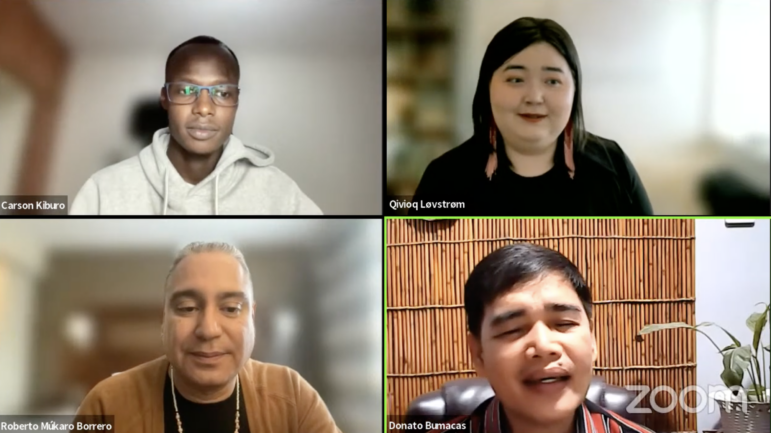
A Spiritual and Social System: Indigenous Leaders Explore Spiritualities, Colonization and the Environment at CEE Forum
“Why do I have to compartmentalize my Indigenous spirituality?”
Community organizer and youth leader Carson Kiburo asked this question at “Freedom to Be: The role of Indigenous spiritualities in averting climate catastrophe and safeguarding planetary health,” a forum presented by the Center for Earth Ethics on April 25. The online meeting, which was an official side event for April’s meeting of the United Nations Permanent Forum on Indigenous Issues in New York, explored how traditional, Indigenous beliefs relate to ecologically sound cultural practices and challenges facing Indigenous beliefs and life systems.
The speakers highlighted the central place of spirituality in the Indigenous experience and worldviews. Anthropologist and activist Qivioq Løvstrøm, an assistant professor at the University of Greenland who also chairs the Human Rights Council of Greenland, pointed out that Indigenous spirituality is “something that we do in our whole body.” There is an “ongoing theme of spirituality in our whole life,” she said.
Indigenous spirituality is “spiritual and social system,” agreed Carson, who is executive director of the Jamii Asilia Centre in Nakuru, Kenya. Foreign religion “steps away from a sense of belonging.”
The speakers emphasized the persistent damage from colonialism. “I have seen how our Indigenous spirituality has been supplanted by foreign religion that has destroyed our culture and our environment,” said Donato Bumacas, executive director of the Kalinga Mission for Indigenous Children and Youth in the Philippines. In the Philippines, he noted, imposition of Catholicism by the Spanish, Protestantism by Americans, and the proliferation of sects has profoundly damaged Indigenous populations.
In Kenya, Carson said “colonists left about 60 years ago, but the effects are still felt today.” And Løvstrøm noted that Indigenous peoples constitute most of Greenland’s population, and they are “trying to decolonize our history.”
Kasike R. Múkaro Borrero (Guainía Taíno Tribe), who moderated, noted that Indigenous spiritualities are “tainted by legacies of religions being used as weapons.” “Many Indigenous people report that their original spiritualities are viewed as superstition or witchcraft,” he said.
Damage to the environment has been an inevitable outcome. “Foreign religions … distanced our religion from the environment,” said Bumacas. “Loss of our culture led to catastrophic deforestation” in the Philippines.
“Christianity is pretty okay with taking advantage of nature,” said Løvstrøm.
This discussion was part of CEE’s focus on Indigenous wisdom, values and rights, notably the October 2022 CEE forum that examined the report on Freedom of Religion or Belief for Indigenous Peoples from the UN Special Rapporteur on Freedom of Religion or Belief. As Karenna Gore, CEE’s executive director, remarked in her introduction, “the cornerstone of our work has been to honor, learn from and support Indigenous peoples, including uplifting their spiritual and cultural traditions and fighting for their rights.”
The UN Office of the Special Rapporteur for Freedom of Religion or Belief, the UN Office of the Special Rapporteur on the Rights of Indigenous Peoples, the Climate Heritage Network, the NGO Committee on the Rights of Indigenous Peoples, the United Confederation of Taino People, Project Access Indigenous Partnership, the Inclusive Conservation Academy, and the Jamii Asilia Centre assisted in organizing this forum.
